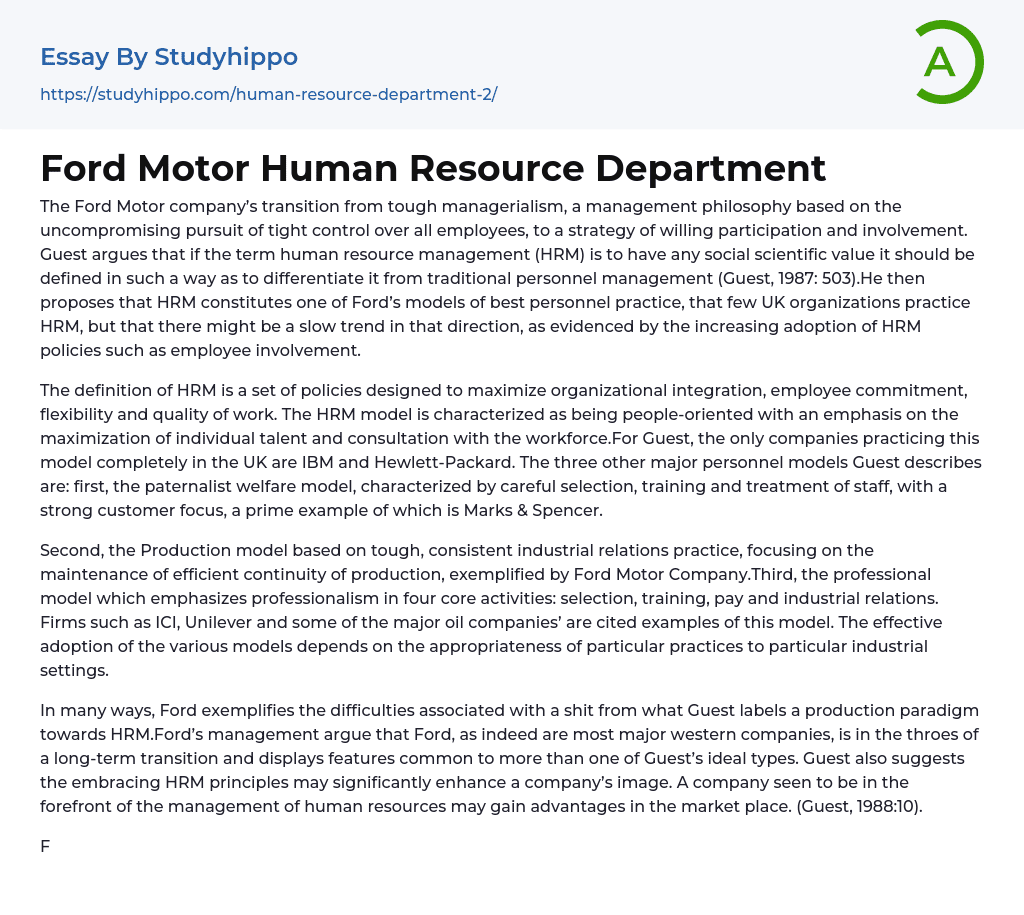The Ford Motor company underwent a shift from tough managerialism, which aimed to strictly control all employees, to a more collaborative approach focused on willing participation. According to Guest, in order for the concept of human resource management (HRM) to hold scientific value, it must be defined in a way that distinguishes it from traditional personnel management (Guest, 1987: 503). Guest proposes that HRM is one of Ford's exemplary personnel practices, and not many UK organizations currently employ HRM techniques, although there appears to be a gradual move toward these policies, indicated by the increased adoption of employee involvement strategies.
The HRM model is defined as a collection of policies aimed at achieving optimal organizational integration, employee commitment, flexibility, and work quality. It is considered a people-centered model that prioritizes maximizing individual talents and consulting with employees. Accordin
...g to Guest, IBM and Hewlett-Packard are the only UK companies that fully implement this model. Guest also outlines three other major personnel models, including the paternalist welfare model which focuses on careful staff selection, training, and treatment, with an emphasis on customer satisfaction. Marks ; Spencer serves as a prime example of this particular model.
The Production model, exemplified by Ford Motor Company, emphasizes tough and consistent industrial relations practice to maintain efficient continuity of production. On the other hand, the professional model puts emphasis on professionalism in four core activities: selection, training, pay, and industrial relations. This model is exemplified by firms such as ICI, Unilever, and some major oil companies. The successful implementation of these models depends on the suitability of specific practices for particular industrial settings.
Ford faces challenges as it moves away from
a production-focused model towards HRM, according to Guest. Ford's management believes this transition is long-term and aligns with more than one of Guest's ideal types. Guest also notes that adopting HRM principles can improve a company's reputation and competitive edge. By effectively managing human resources, a company can gain market advantages. (Guest, 1988:10).
One way of attracting sales is by presenting the company's image as socially responsible and providing quality products. Ford's approach to advertising during 1990-1992 was centered around showing employees engaging in personal development, highlighting the importance of their personnel practices. Ford Motor Company's overhaul in the 1980s serves as a significant example of changes in personnel practices. This article focuses on Ford's experience due to its historical significance as a traditional production approach pioneer and the magnitude of changes it initiated during the 1980s. The changes reflected a critical re-evaluation of the production approach, a significant move towards strategic HRM.
Ford is known for creating the management style, Fordism, which involves hierarchical decision-making and strict functional specialization. This style also incorporates specialized machinery to mass produce a standard product for mass markets. Ford's continuous efforts to redesign jobs, organization and culture were influenced by a combination of market and technological factors. To rethink personnel management, Ford used a model inspired by Japanese practices and benchmarked against its close links with Mazda, in which it owns a 25% stake. This served as the foundation for its long-term strategy. (Starkey ; McKinlay, 1989).
Despite attempting to introduce aspects of Japan-like industrial organization for future strategic change, the Fordist system provided important elements of continuity. The company is currently negotiating a major transition period as they strive to
reconcile Ford's short and long-term objectives while maintaining established managerial practices and work organization patterns essential to current competitiveness (Starkey and McKinly 1989:94).
- Qualities essays
- Adidas essays
- Amazon essays
- Apple essays
- Bmw essays
- British Airways essays
- Burger King essays
- Coca-Cola essays
- Company essays
- Costco essays
- Dell essays
- Ebay essays
- Enron essays
- Facebook essays
- Ford Motor Company essays
- Gap essays
- General Motors essays
- Google essays
- Honda essays
- Ibm essays
- Ikea essays
- Intel essays
- Iphone essays
- Johnson and Johnson essays
- Kellogg essays
- Key essays
- Kfc essays
- Mcdonald's essays
- Microsoft essays
- Myspace essays
- Nestle essays
- Netflix essays
- Nike essays
- Nokia essays
- Pepsi essays
- Pepsico essays
- Red Bull essays
- Ryanair essays
- Samsung essays
- Sony essays
- Southwest Airlines essays
- Starbucks essays
- Supermarket essays
- Tesco essays
- Toyota essays
- Twitter essays
- Volkswagen essays
- Walmart essays
- Bacteria essays
- Biotechnology essays




